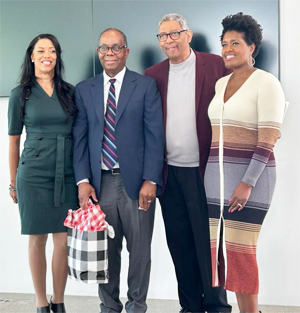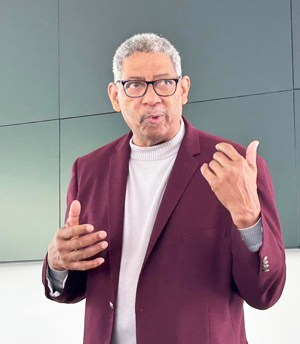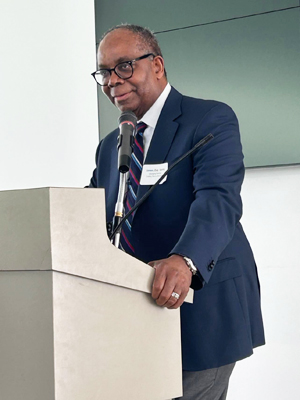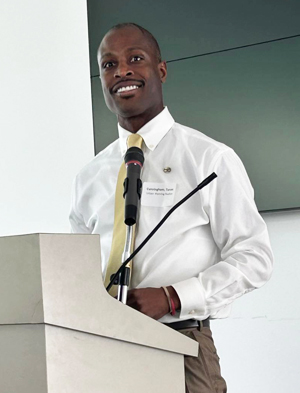
By Fletcher Word
The Truth Editor
As part of the effort to launch the Dorr Street Project, Robert Smith and the African American Legacy Project hosted a luncheon gathering on Friday, April 5 at the Toledo Museum of Art. Friday’s guest speaker was Larry James, a Columbus attorney who has been immensely successful in establishing the city’s MLK Jr. Center for Performing & Cultural Arts and leading the renovation of the Lincoln Theatre.
The Dorr Street Project, as envisioned by Robert Smith, who founded the AALP almost 20 years ago, “is a volunteer-driven effort designed with the expressed intent of telling the story of how this community evolved. The Dorr Street Project celebrates those who came before us with the hope of stimulating both young and old to search for the intersect where investment meets opportunity,” Smith has written.
Friday’s event at the Museum’s Glass Pavilion which was moderated by Tiffany Tarpley, WTOL-TV anchor, featured a welcome by Adam Levine, TMA president, and remarks by state Senator Paula Hicks-Hudson and U.S. Representative Marcy Kaptur before the guest speaker James offered his thoughts on the successful development of a cultural arts center.

Larry James has been part of the Columbus legal, business, civic and political scene for four decades. The managing partner of the law firm of Crabbe, Brown & James, he is a co-founder of the African American Leadership Academy, a board trustee for the Grater Columbus Arts Council, the Columbus Museum of Art, Columbus Zoo and Aquarium and the Columbus Urban League.
In 1987 James accepted the challenge of putting together a community board in a way to establish an arts tribute to Dr. Martin Luther King, Jr.
The cultural arts institution, James noted, “started in a dilapidated [closed] school.” His task was to first raise $2.3 million to renovate the building and then to get the Black community on board and overcome its skepticism about the project and his ability to spearhead it.
First the board “started community concerts to reinforce the neighborhood and create memories,” said James. After the Black community was involved, the “commercial community eventually became involved.”
James offered a word of caution for those in his Toledo audience who wish to take on the same daunting task. “This word is going to be painful,” he warned. “Getting started in the Black community and then getting the majority community involved.”

As painful as that almost two decades experience was for James and his board at the King Arts Center, he took on another similar task in 2008 when the mayor sought him out to renovate the old Lincoln Theatre, a one time Black-only theatre during segregation times, and turn it into a thriving performing arts center.
Once again James used his connections to put together a stellar board and get the funds raised. Ultimately outstanding programming garnered the support of the community and now the Lincoln Theatre “is the most utilized theatre in central Ohio,” he said.
In 2018 when the board started planning for a 100-year celebration of the Harlem Renaissance, they were able to bring together the city’s black community in a way to showcase “Black art by Black artists.
According to James, the Washington Post reported of the Harlem Renaissance project that “New York tried it but Columbus got it right.”
The King Art Center and the Lincoln Theatre are about five minutes apart, said James, and just last year, Franklin County Commission Kevin Boyce, suggested to James that he would like to start a Black-owned bank in the same area. The bank, due to Boyce’s leadership, opened last week.
“Everything we thought about in 1987 has happened,” said James as he concluded his speech.
Taron Cunningham, a Toledo urban planner, followed James’ presentation with an explanation of the goals of the Dorr Street Project and the hope that it “will bring the heroes and sheroes of arts as a catalyst to a cultural corridor.” That corridor, he said, will connect a “booming downtown” with the vibrant University of Toledo campus on the other end of Dorr.
A community Listening Session is planned for May 18 at 6:30 p.m. at the Indiana Avenue Missionary Baptist Church to begin the process of obtaining community input.

